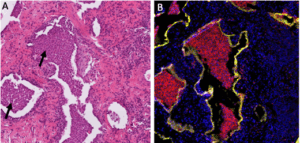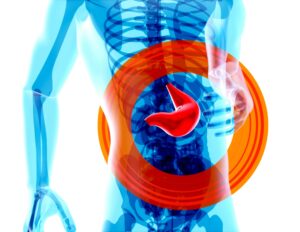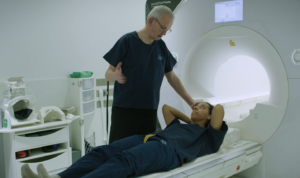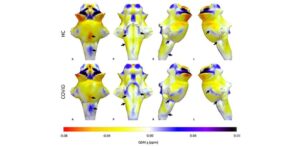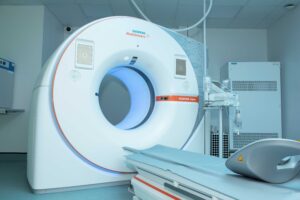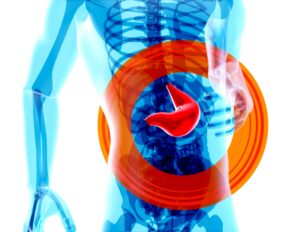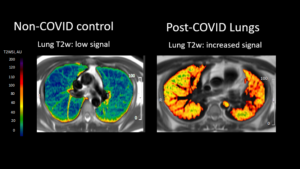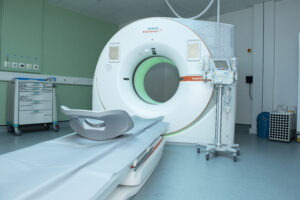Unequal access to early pregnancy scans delays detection of serious conditions. Early screening resulted in earlier detection for 40% of anomalies, including heart and limb issues. Researchers from the University of Oxford, supported by NIHR Oxford Biomedical Research Centre, together with ... READ MORE
News for Imaging
Two world firsts in myeloma trials at OUH
Two world firsts have taken place in trials at Oxford University Hospitals to tackle the blood cancer myeloma. One of the trials is testing a new tracer to be used on myeloma patients during PET-CT scans; the other is investigating a new potential drug combination therapy. A key factor in both ... READ MORE
Levelling the medical devices playing field for all pregnant women
How can bias in the medical devices used during pregnancy and the neonatal period affect health outcomes, especially for minority ethnic and socio-economically disadvantaged groups? An Oxford University project, supported by the NIHR Oxford Biomedical Research Centre (BRC), is aiming to use the ... READ MORE
Oxford researchers create first atlas showing cell interaction in lung fibrosis
Researchers have developed the first mathematically supported cellular map of lung tissue in idiopathic pulmonary fibrosis (IPF) and uncovered key immune cell interactions that could explain why lungs fail to repair in this deadly disease with no known cure. The study by researchers at the ... READ MORE
Recruitment opens for UK-wide liver cancer imaging study
A new UK-wide clinical study aimed at transforming liver cancer surveillance in people with cirrhosis has opened to recruitment. The AMULET study, led by the University of Oxford, is comparing a new MRI technique to standard ultrasound surveillance, with a view to improving early detection of ... READ MORE
“We need clear pathways and structured support for allied health professionals to pursue a research career”
Miriam Lacharie is a diagnostic radiographer in the Oxford Centre for Clinical Magnetic Resonance Research (OCMR). In June 2024, she received a predoctoral award from the NIHR Oxford BRC and is currently researching imaging markers to predict disease progression in the genetic heart condition ... READ MORE
“It gives you breathing space and the confidence to step into a leadership role”
Megha Agarwal is a clinical research fellow in the University of Oxford’s Radcliffe Department of Medicine (RDM). She took part in the Women in Leadership training course organised by the NIHR Oxford BRC’s Cardiovascular Theme, the first such training provided by the BRC specifically aimed at ... READ MORE
Lowering the barriers to participation in brain imaging research
Oxford BRC-supported researchers have produced videos aimed at increasing the diversity of participants taking part in brain imaging research studies. These ‘what to expect’ videos are part of a wider project by the BRC’s Imaging Theme and the University of Oxford’s Wellcome Centre for ... READ MORE
Damage to brain’s ‘control centre’ behind long-lasting COVID-19 symptoms, MRI scans show
Damage to the brainstem – the brain’s ‘control centre’ – is behind long-lasting physical and psychiatric effects of severe COVID-19 infection, a study has suggested. Using ultra-high-resolution scanners that can see the living brain in fine detail, researchers from the Universities of Cambridge ... READ MORE
Patient story – Kathryn Hedigan, EXPLAIN study
Kathryn Hedigan took part in the EXPLAIN study, which used hyperpolarised xenon MRI scans to investigate possible lung damage in long COVID patients who had not been hospitalised with COVID-19 but who continued to experience breathlessness. Kathryn, aged 66, lives near Burford in West ... READ MORE
Heart scans could help thousands avoid unnecessary invasive procedure
Thousands of patients admitted to hospital every year with suspected heart attacks could avoid an unnecessary invasive procedure if they have a routine heart MRI scan first, according to new research. The study, funded by the NIHR Oxford Biomedical Research Centre (BRC) and British Heart ... READ MORE
AI analysis of heart scans predicts risk of developing heart problems ten years in advance
A University of Oxford research team has developed an artificial intelligence (AI) technology which can accurately predict the risk of a heart attack, heart failure or cardiac death from routine cardiac CT scans, up to ten years in advance. The study, funded by the British Heart Foundation and ... READ MORE
Study outlines feasibility of multiple disease risk prediction model for primary care
A team of researchers have found that a single, integrated health check carried out in a primary care setting can accurately predict risks for diseases across multiple organs. Currently, GPs are often limited to assessing the risk of diseases one at a time, a process that is ... READ MORE
Study assesses new MRI technique to detect liver cancer
Oxford researchers have been awarded funding to conduct a study comparing a new type of MRI (Magnetic resonance imaging) to standard of care ultrasound for liver cancer surveillance in people with cirrhosis. The University of Oxford’s DeLIVER team, which is investigating early detection methods ... READ MORE
NHS health checks can help to reduce disease rates and mortality, study finds
A University of Oxford study has found that attending an NHS Health Check is associated with a decreased risk of dying and of diseases, such as dementia, heart attack, kidney disease and liver cirrhosis. The results, published in BMC Medicine, suggest that preventative programmes such as ... READ MORE
AI tool could help thousands avoid fatal heart attacks
An AI tool that can predict 10-year risk of deadly heart attacks, could transform treatment for patients who undergo CT scans to investigate chest pain, according to research supported by the NIHR Oxford Biomedical Research Centre (BRC). In the first real-world trial of the AI tool, it was ... READ MORE
Longer-term organ abnormalities confirmed in some post-hospitalised COVID patients
A study looking at the longer-term impact of COVID-19 has found that nearly a third of patients admitted to hospital with COVID-19 displayed abnormalities in multiple organs five months after being discharged. Some of these abnormalities have been shown through previous work to be evidence of ... READ MORE
Blood clots during COVID-19 may cause ongoing cognitive problems
High levels of two proteins at the time of COVID-19 have been found in patients who later experienced cognitive problems, including ‘brain fog'. The findings give a major clue as to one cause of their symptoms: blood clots. Researchers from the University of Oxford looked at blood tests from ... READ MORE
New imaging method trialled for retinal diseases
Clinical scientists in Oxford have presented a new method of imaging of the retina that overcomes many of the drawbacks of the current standard way of diagnosing and monitoring retinal diseases like age-related macular degeneration (AMD). The study, whose findings were published in the journal ... READ MORE
New imaging centre performs first stroke thrombectomy
A new imaging centre at the John Radcliffe Hospital carried out its first stroke thrombectomy. The Acute Multidisciplinary and Interventional Centre (AMIIC) carried out the procedure on 17 May as part of its partnership with Oxford University Hospitals (OUH) NHS Foundation Trust. A ... READ MORE



